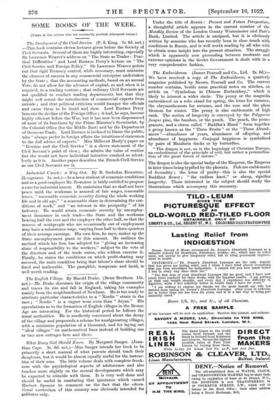SOME BOOKS OF THE WEEK.
[Notice in this column does not necessarily preclude subsequent review.'
The Development of the Civil Service. (P. S. King. 7s. 6d. net.) —This book contains eleven lectures given before the Society of Civil Servants. Several of them are highly interesting, especially Sir Lawrence Weaver's address on " The State as Trader : Prac- tical Difficulties " and Lord Eustace Percy's lecture on " The Civil Service and Foreign Policy." Sir Lawrence Weaver points out that rigid Treasury control, while necessary, must minimize the chances of success in any commercial enterprise undertaken by the State ; that the accounting methods, based on an annual Vote, do not allow for the advance of capital, as and when it is required, to a trading venture ; that ordinary Civil Servants are not qualified to conduct trading departments but that they might well resent the introduction of commercial experts from outside ; and that political criticism would hamper the officials and cause them to be timid and slow. Lord Eustace Percy laments the decline of the Foreign Office ; it had, he says, become highly efficient before the War, but it has now been dispossessed of most of its functions by the Prime Minister's Secretariat, by the Colonial Office (for the Middle East) and by the Department of Overseas Trade. Lord Eustace is inclined to blame the public, who " always prefer in foreign affairs the intuitions of statesmen to the dull advice of experts." Miss Millicent Murfy's paper on " Routine and the Civil Service " is a clever statement of the Civil Servant's point of view ; she admits the value of routine but she would not have individual initiative crushed so relent- lessly as it is. Another paper describes the French Civil Service as our Civil Servants see it.


































 Previous page
Previous page